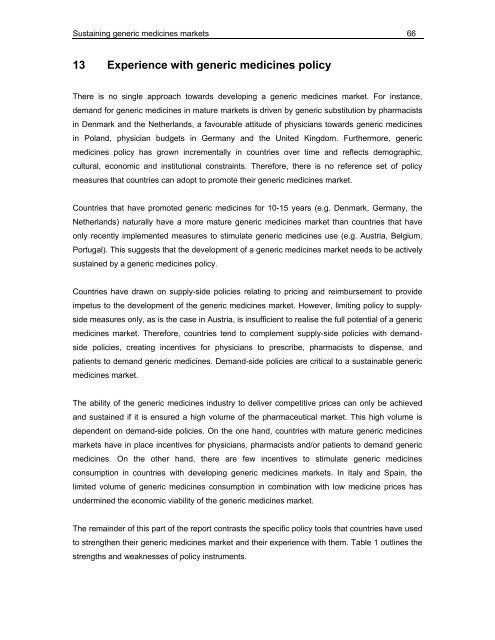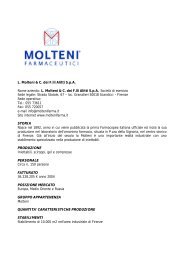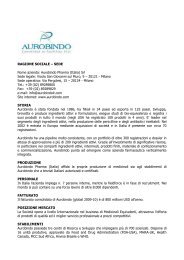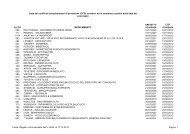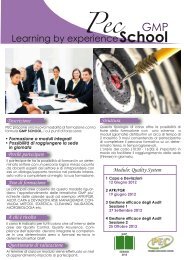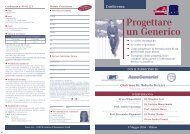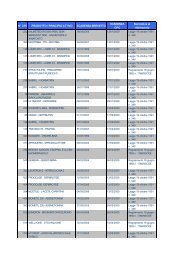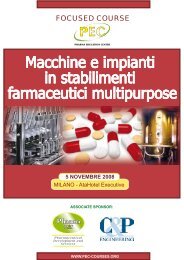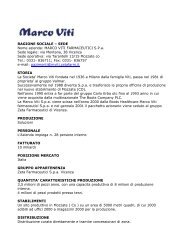Sustaining Generic Medicines Markets in Europe
Sustaining Generic Medicines Markets in Europe
Sustaining Generic Medicines Markets in Europe
You also want an ePaper? Increase the reach of your titles
YUMPU automatically turns print PDFs into web optimized ePapers that Google loves.
<strong>Susta<strong>in</strong><strong>in</strong>g</strong> generic medic<strong>in</strong>es markets 6613 Experience with generic medic<strong>in</strong>es policyThere is no s<strong>in</strong>gle approach towards develop<strong>in</strong>g a generic medic<strong>in</strong>es market. For <strong>in</strong>stance,demand for generic medic<strong>in</strong>es <strong>in</strong> mature markets is driven by generic substitution by pharmacists<strong>in</strong> Denmark and the Netherlands, a favourable attitude of physicians towards generic medic<strong>in</strong>es<strong>in</strong> Poland, physician budgets <strong>in</strong> Germany and the United K<strong>in</strong>gdom. Furthermore, genericmedic<strong>in</strong>es policy has grown <strong>in</strong>crementally <strong>in</strong> countries over time and reflects demographic,cultural, economic and <strong>in</strong>stitutional constra<strong>in</strong>ts. Therefore, there is no reference set of policymeasures that countries can adopt to promote their generic medic<strong>in</strong>es market.Countries that have promoted generic medic<strong>in</strong>es for 10-15 years (e.g. Denmark, Germany, theNetherlands) naturally have a more mature generic medic<strong>in</strong>es market than countries that haveonly recently implemented measures to stimulate generic medic<strong>in</strong>es use (e.g. Austria, Belgium,Portugal). This suggests that the development of a generic medic<strong>in</strong>es market needs to be activelysusta<strong>in</strong>ed by a generic medic<strong>in</strong>es policy.Countries have drawn on supply-side policies relat<strong>in</strong>g to pric<strong>in</strong>g and reimbursement to provideimpetus to the development of the generic medic<strong>in</strong>es market. However, limit<strong>in</strong>g policy to supplysidemeasures only, as is the case <strong>in</strong> Austria, is <strong>in</strong>sufficient to realise the full potential of a genericmedic<strong>in</strong>es market. Therefore, countries tend to complement supply-side policies with demandsidepolicies, creat<strong>in</strong>g <strong>in</strong>centives for physicians to prescribe, pharmacists to dispense, andpatients to demand generic medic<strong>in</strong>es. Demand-side policies are critical to a susta<strong>in</strong>able genericmedic<strong>in</strong>es market.The ability of the generic medic<strong>in</strong>es <strong>in</strong>dustry to deliver competitive prices can only be achievedand susta<strong>in</strong>ed if it is ensured a high volume of the pharmaceutical market. This high volume isdependent on demand-side policies. On the one hand, countries with mature generic medic<strong>in</strong>esmarkets have <strong>in</strong> place <strong>in</strong>centives for physicians, pharmacists and/or patients to demand genericmedic<strong>in</strong>es. On the other hand, there are few <strong>in</strong>centives to stimulate generic medic<strong>in</strong>esconsumption <strong>in</strong> countries with develop<strong>in</strong>g generic medic<strong>in</strong>es markets. In Italy and Spa<strong>in</strong>, thelimited volume of generic medic<strong>in</strong>es consumption <strong>in</strong> comb<strong>in</strong>ation with low medic<strong>in</strong>e prices hasunderm<strong>in</strong>ed the economic viability of the generic medic<strong>in</strong>es market.The rema<strong>in</strong>der of this part of the report contrasts the specific policy tools that countries have usedto strengthen their generic medic<strong>in</strong>es market and their experience with them. Table 1 outl<strong>in</strong>es thestrengths and weaknesses of policy <strong>in</strong>struments.


